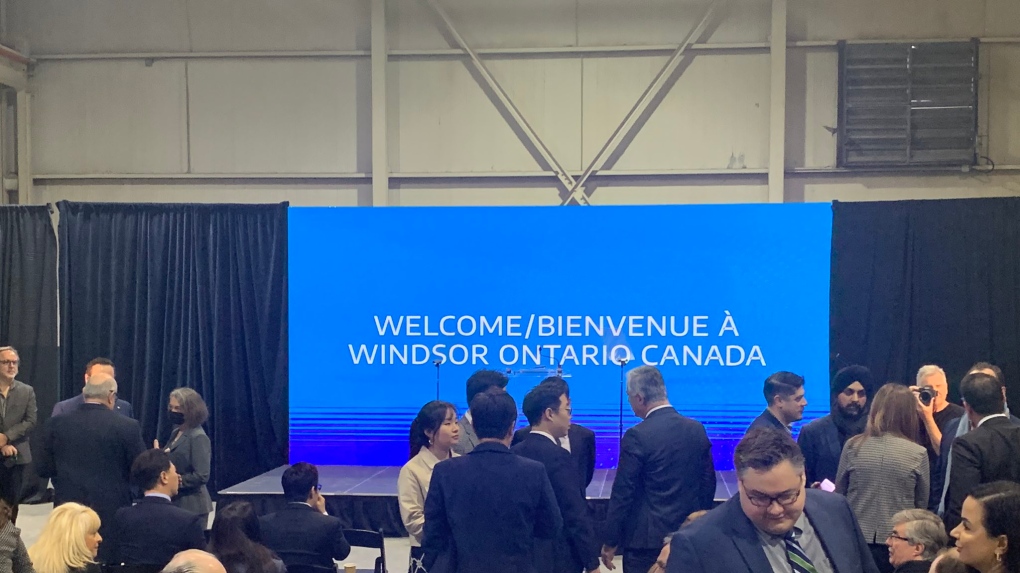'We bagged a unicorn': New EV battery manufacturing plant announced for Windsor
Windsor will be home to the first electric vehicle battery manufacturing operation in Canada, the nearly $5-billion joint venture is expected to create an estimated 2,500 jobs for the area.
A number of politicians and business leaders were in Windsor for the big announcement Wednesday that Stellantis and LG Energy Solution have executed “binding, definitive agreements” to establish an electric vehicle battery plant which will produce lithium-ion battery cells and modules in the region.
“We are the automotive capital of Canada. We are claiming the title of the automobility capital of Canada,” Mayor Drew Dilkens said.
The batteries will initially supply all of Stellantis’ North American electric vehicles.
“The cars of the future will be built in Ontario from start to finish,” Premier Doug Ford said.
Stellantis and LG Energy expect the plant will serve as a catalyst for the creation of a strong battery supply chain in the region.
“It’s one of these things that every community would like to get. Today, we bagged a unicorn,” Dilkens said.
The plant aims to have an annual production capacity of more than 35 gigawatt hours and will create an estimated 2,500 new jobs for the Windsor-Essex region.
But it’s the accompanying supply chain that is expected to put tens of thousands more to work.
“We’re the only place in the Western Hemisphere that has everything you need, not only to build an EV battery, but to build electric vehicles. The complete supply chain, the full ecosystem. That’s what makes it so historic,” Fedeli said.
CTVNews.ca Top Stories

'Why would I box myself in?': Singh on why he won't commit to helping bring Trudeau's gov't down, yet
NDP Leader Jagmeet Singh says U.S. president-elect Donald Trump's looming tariff threat is part of the reason why he's not committing to voting non-confidence in Prime Minister Justin Trudeau's government.
Donald Trump says Canada becoming 51st U.S. state is 'a great idea.' Jean Charest calls the comment a 'wake-up call'
U.S. President-elect Donald Trump is taking aim at Canada once more, saying it would be 'a great idea' to make it America's ‘51st state.'
'It's a giant mess': Confusion remains about the GST/HST holiday
The organization representing small and medium size businesses in Canada says the start to the GST and HST holiday has been 'a giant mess.'
B.C. man drops camera into ocean, accidentally captures 'breathtaking' whale video
Before it turned into an extraordinary day, Peter Mieras says it began being quite ordinary.
Police suspect Utah father killed his wife and 3 kids, wounded son, then killed himself
Five people were found dead in a Utah home after a man apparently shot his wife and four children before killing himself, police said Wednesday. A 17-year-old boy survived but has a severe brain injury.
Invasive 'murder hornets' are wiped out in the U.S., officials say
The world's largest hornet, an invasive breed dubbed the “murder hornet” for its dangerous sting and ability to slaughter a honey bee hive in a matter of hours, has been declared eradicated in the U.S., five years after being spotted for the first time in Washington state near the Canadian border.
What's the best treatment for ADHD? Large new study offers clues
Stimulant medications and certain therapies are more effective in treating ADHD symptoms than placebos, a new study on more than 14,000 adults has found.
'You're either with Beijing or you're with Washington': Ford says to Mexico in CNN interview
Ontario Premier Doug Ford has a message for Mexico as the threat of tariffs by incoming president Donald Trump hangs over both sides of the U.S. border.
Oldest stone tablet inscribed with Bible's Ten Commandments sells for US$5 million
The oldest known tablet inscribed with the Ten Commandments from the Old Testament sold on Wednesday for US$5.04 million, more than double its high estimate.


































